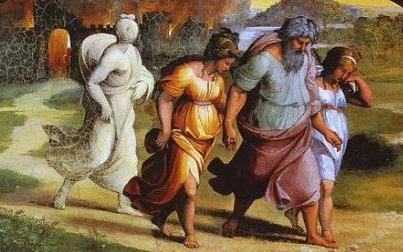
While certainly a literal historical event, in a lot of ways the story of Sodom and Gomorrah can also be seen as a symbolic illustration of the salvation experience itself.
In such an illustration, Sodom and Gommorah represents the world. It is described as a place whose sin was so grievous, it required a visitation from the Lord.
The angelic messengers represent the presentation of the Gospel. It gives light to those with eyes to see and points to the way of salvation, away from destruction. Yet, the very same results in blindness for those who are unrepentant (II Corinthians 4:1-4; Hebrews 3:7-8).
This blindness is so profound, that those who are unrepentant cannot even find the door, which is Christ Himself (John 10:7-9). Even those who receive the message still have no ability in and of themselves to affect their own salvation.
“And while he [Lot] lingered, the men laid hold upon his hand, and upon the hand of his wife, and upon the hand of his two daughters; the LORD being merciful unto him: and they brought him forth, and set him without the city.” Genesis 19:16
Lot recognized the messengers as Godly and had received them unto himself. Yet, although they repeatedly told them to flee, he still lingered. The angels had to physically take hold of Lot and his family and compel them out of Sodom.
Man is a slave to sin and has no power to separate himself from sin. If God does not intervene and bring man out by His own power, man would be ever lost. Receiving the truth of the Gospel is not an act of man deciding to save himself; it is man acknowledging the one thing that reveals to us the door (Christ) whereby we might be saved. It is then God’s mercy alone which brings us through that door unto salvation. In doing so, God sets us outside of the contaminations of the world and sin.
Notice, however, that being saved from Sodom was not the end of their journey.
“And it came to pass, when they had brought them forth abroad, that he said, Escape for thy life; look not behind thee, neither stay thou in all the plain; escape to the mountain, lest thou be consumed.” Genesis 19:17
Once freed from the boundaries of the world/sin, they are then instructed not to stay where they are or even to look behind them, but to run to higher ground (Psalm 61:2; Isaiah 55:8-9; Philippians 3:14). This wasn’t just a nice thing to do, but was necessary that they still not be consumed by the coming destruction (Isaiah 52:11; Jeremiah 51:6, 45, 50; Matthew 24:16; II Corinthians 6:17; Revelation 18:4)! They are told to escape for their lives to the mountain, which in Scripture is often a figure for God (Numbers 16:24-33; Psalm 2:6; Psalm 36:6; Psalm 125:2; Isaiah 2:2-3; Revelation 21:10).
Once we are separated from the world by God, we too must then run the race which takes us ever closer to God (Luke 16:16; Philippians 3:13-14; Hebrews 6:1; II Timothy 4:7). We cannot stand still in the Lord and we must not look back. The result of not heeding this warning is visible in Lot’s wife.
“Then the LORD rained upon Sodom and upon Gomorrah brimstone and fire from the LORD out of heaven; And he overthrew those cities, and all the plain, and all the inhabitants of the cities, and that which grew upon the ground. But his wife looked back from behind him, and she became a pillar of salt.” Genesis 19:24-26
Now we see the importance of the angels’ commands that they run to the mountain. The cities, the inhabitants of the cities, the plains surrounding the cities, and all that grew upon the ground around the cities were destroyed. When judgment comes, the only safe place to be found is in Christ.
Scripture does not say why Lot’s wife looked back. It could have been a longing for family, friends, possessions, or anything from that former life which was being left behind. Per the angels’ warning, she was indeed “consumed”.
Perhaps this is why Jesus’ very next warning to us after this is:
“Whosoever shall seek to save his life shall lose it; and whosoever shall lose his life shall preserve it.” Luke 17:33
We cannot go forward into new life in Christ while looking backwards. Attempting to do so merely compromises our walk with the Lord (Proverbs 14:14; Hebrews 10:38). We are called by God to be the salt of the earth, but when we nurture within us a longing for the things in the world, we become unusable. Instead of being salt poured out to preserve the way of the Lord in the earth, we become stoic and fortified within ourselves. The direction of our focus shows us to still be lovers of our own selves and our own lives.
In the last days, when speaking of His imminent return, Jesus tells us to remember Lot’s wife. Let us really consider these words and redeem the times. Set your face like a flint to draw nearer to God and not be entangled in the affairs of this worldly life.


Thanks Tim. The warning of the Lord is indeed quite somber with reference to the actual meaning of the word “lose” in the quoted verse: “Whosoever shall seek to save his life shall lose it; and whosoever shall lose his life shall preserve it” [Luke 17:33].
It means “to destroy.”
“To destroy” is a much more powerful phrase than “to lose”. To take up one’s cross and die daily is more akin “to destroy” than it is “to lose”. The cross was a place of death: death is very final. Thanks, R.J., for the input.